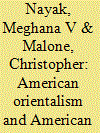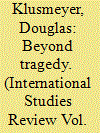|
|
|
Sort Order |
|
|
|
Items / Page
|
|
|
|
|
|
|
| Srl | Item |
| 1 |
ID:
089259


|
|
|
|
|
| Publication |
2009.
|
| Summary/Abstract |
In this essay, we argue that critical International Relations (IR) scholars must consider American Orientalism in tandem with American Exceptionalism in order to better understand US identity, foreign policymaking, and hegemony. We claim that American Exceptionalism is a particular type of American Orientalism, a style of thought about the distinctions between the "West" and the "East" that gives grounding to the foundational narrative of "America." While Exceptionalism and Orientalism both deploy similar discursive, ontological, and epistemological claims about the "West" and its non-western "Others," Exceptionalism is also rooted specifically in American political thought that developed in contradistinction to Europe. As such, we demonstrate that different logics of othering are at work between the West and the non-West, and among Western powers. We implore critical IR scholars to interrogate how the United States and Europe alternatively collude and clash in wielding normative power over their non-Western Others. We claim such research is important for exploring the staying power of American hegemony and understanding the implications of European challenges to American foreign policy, particularly given recent concerns about a so-called transatlantic divide.
|
|
|
|
|
|
|
|
|
|
|
|
|
|
|
|
| 2 |
ID:
089262


|
|
|
|
|
| Publication |
2009.
|
| Summary/Abstract |
Hans Morgenthau claimed that a tragic perspective enables us to confront more squarely the harsh realities of politics, the evil aspects of human nature, and the ethical compromises action requires. Richard Lebow has more recently identified Morgenthau as an exemplar in making his own case for the "tragic vision." This essay contrasts the sharp differences between Morgenthau's and Hannah Arendt's response to the Holocaust to challenge Morgenthau's claim, and to illustrate the limitations of a tragic perspective. Her turn to law in confronting the problems of evil and responsibility that the Holocaust had so radically posed underscores the need to draw upon other conceptual resources beyond tragedy in our critical engagement with such issues.
|
|
|
|
|
|
|
|
|
|
|
|
|
|
|
|
| 3 |
ID:
089260


|
|
|
|
|
| Publication |
2009.
|
| Summary/Abstract |
This article offers a survey of the literature on European Economic and Monetary Union (EMU), in particular works that deal with the question why EMU happened and, based on this literature, what one might be able to conclude about its sustainability. It reviews the literature by dividing up the analyses into four categories: those that explain EMU at the global and at the European Union (EU) levels of analysis, explanations at the national level, and explanations at the domestic level of analysis. The review suggests that EMU was a particular European response to global developments, which was possible because of existing EU institutions. EMU was causally motivated by a Franco-German deal, balancing national interests. Domestic motives reflect essentially opportunistic motives, and thus, cannot explain EMU. In our judgment the review suggests that Europe's single currency will remain sustainable as long as the Franco-German political deal sticks, the belief in the "sound money" idea remains hegemonic in Europe, and the losers from EMU are underrepresented in national and EU institutions. While opportunistic domestic motives cannot explain embarking on a long-term project, they can definitely be sufficient to derail such a project.
|
|
|
|
|
|
|
|
|
|
|
|
|
|
|
|
| 4 |
ID:
089261


|
|
|
|
|
| Publication |
2009.
|
| Summary/Abstract |
Research on transitions has reached a crossroad. Should it be abandoned because the third wave of transitions to democracy has ended, or should it continue because so much remains unaccounted for regarding the third wave? This paper suggests that regime hybridity constitutes a widespread institutional setting resulting from incomplete transitions. Regime-hybridity is defined as a specific regime type in which "partial regimes" within the "political regime" are democratic while others are nondemocratic, although not necessarily authoritarian. Underlying the concept is the assumption that the "political regime" stretches beyond the institutions of the state to include civil society. It is at this level that the work on transitions can be connected to the research on the dynamics of economic exclusion in the context of rent economies. This paper develops a checklist for identifying "partial regimes" that constitute regime-hybridity and applies it to the case of Colombia to identify linkages between political transition and socioeconomic transformation.
|
|
|
|
|
|
|
|
|
|
|
|
|
|
|
|
|
|
|
|
|